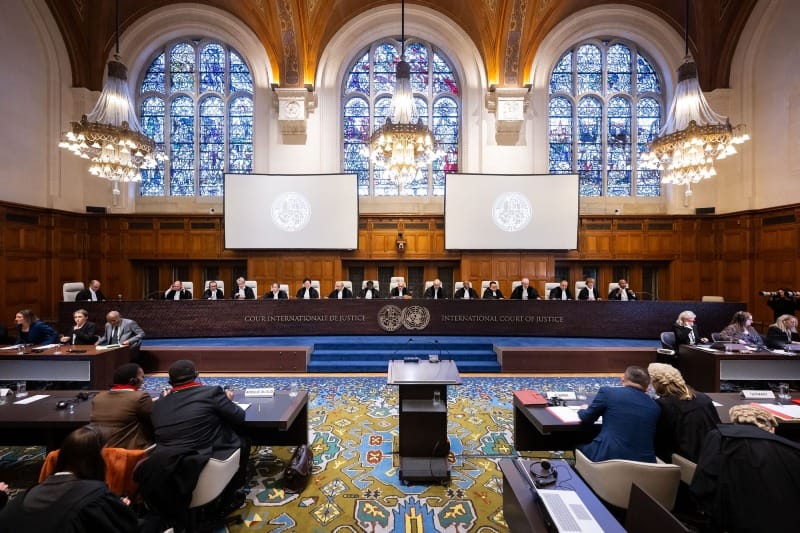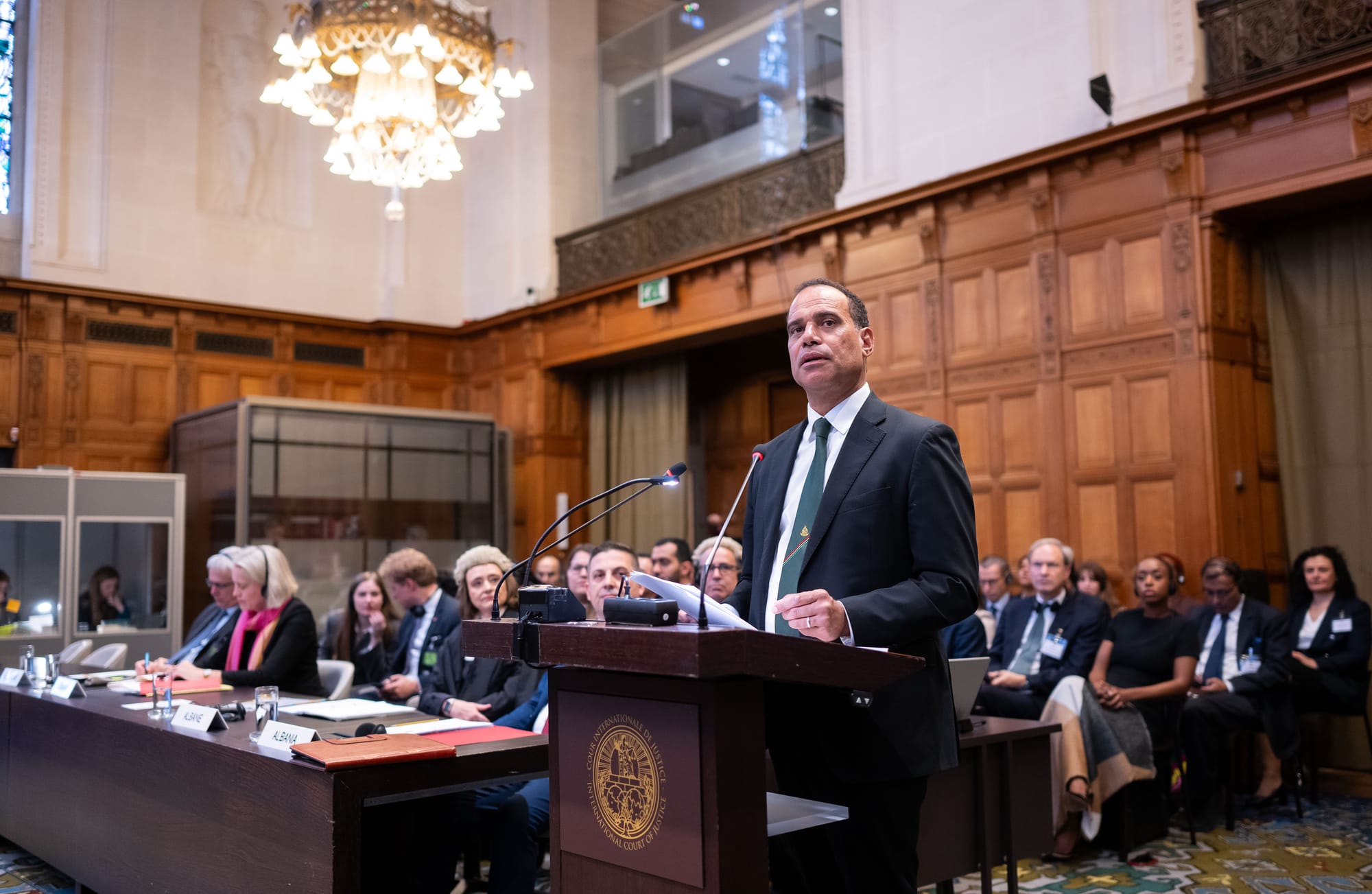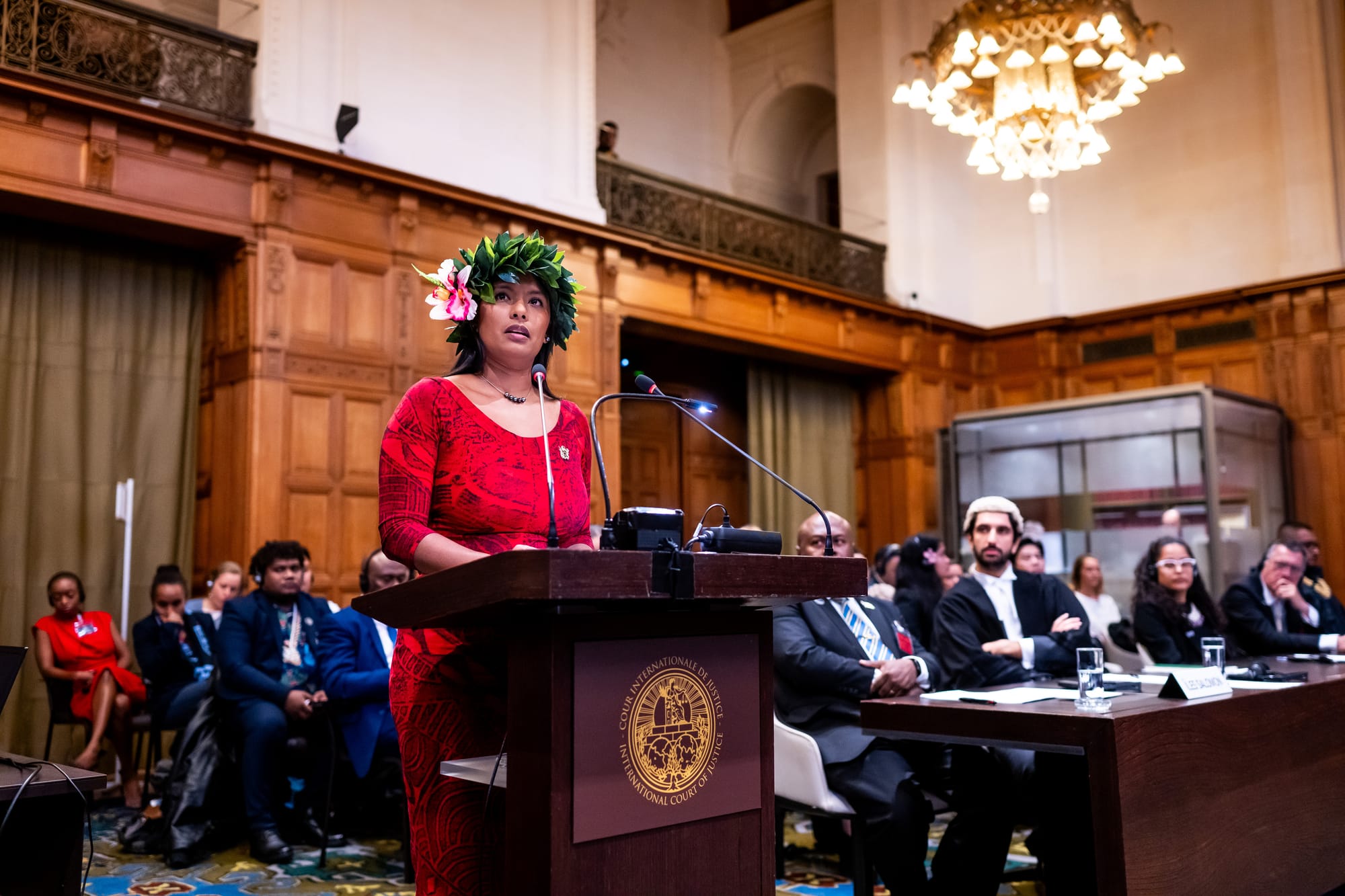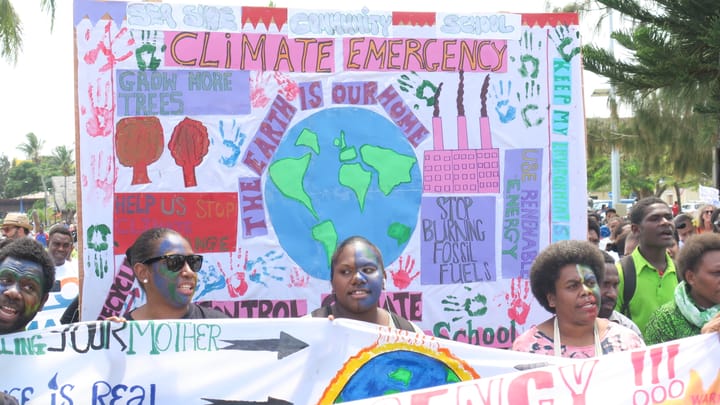Court Hearings In The “Most Consequential Case In The History Of Humanity” Have Concluded. Here’s What You Need To Know

With record-level participation and potentially far-reaching impacts, this climate justice case is the biggest court case in the world.
Article co-published with One Earth Now
The International Court of Justice (ICJ) has wrapped up two weeks of hearings in a landmark climate justice case that could have long-lasting impacts on global climate change governance and law. The hearings, held December 2 through December 13 in The Hague, Netherlands, saw many small developing countries in the Global South call for legal accountability and justice for a crisis that threatens their survival but that they did not create, while countries that emit high levels of greenhouse gases tried to deflect from their responsibility and insisted that legal obligations to address climate change under international law are limited to specialized climate treaties. Small island states that are at risk of disappearing under rising seas pleaded for their rights to self-determination and sovereignty, and they stood up in court against the positions of some of the world’s biggest climate polluters like the United States.
“We’re seeing a true David and Goliath battle playing out,” Joie Chowdhury, a senior attorney with the Center for International Environmental Law, said at a media briefing midway through the hearings.
The ICJ, which is the judicial body of the UN, was tasked by the UN General Assembly with issuing an advisory opinion on countries’ legal responsibilities to act on climate change as well as the legal consequences for causing significant climate harm. The court has received input in the form of both written submissions and oral statements, and now the fifteen judges are beginning deliberations. The court’s opinion could come sometime in 2025.
What makes this case so extraordinary? And what were some of the highlights and takeaways from this month’s hearings?
A truly historic case, and a “watershed moment for climate justice”
The monumental and historic significance of these proceedings, according to legal experts in the areas of climate change and human rights, cannot be overstated.
“History was made in The Hague these past two weeks. The climate hearings at the ICJ have been a watershed moment for climate justice, human rights, and legal accountability,” said Nikki Reisch, director of the climate and energy program at the Center for International Environmental Law.
David Boyd, a former UN independent expert (special rapporteur) on human rights and the environment, called it “the most important legal proceeding in the history of humanity, addressing what is an existential threat to the future of human society.”
This case, which grew out of a youth-led campaign started by Pacific Islands law students, marks the first time that the world’s highest court is addressing what scientists warn is a global climate emergency. “We have taken the world’s biggest problem to the world’s highest court,” Vishal Prasad, director of Pacific Islands Students Fighting Climate Change, the group that initiated the campaign, said at a December 13 media briefing. That in itself is a remarkable accomplishment. And while the court’s forthcoming advisory opinion will not itself stop or ‘solve’ the problem of climate change, it will be influential in terms of clarifying international law pertaining to climate, and it could help catalyze greater climate action.
The proceedings have seen a record level of participation, with more than 90 written submissions and over 100 oral statements; the court heard from 96 states and 11 international organizations during the two weeks of hearings. That makes this the biggest court case in the world, at least in terms of engagement.
But it is not just the truly global scope of this case that signifies its importance. It is also the potential impact that the outcome may have in laying the foundation for a much more robust and equitable response to the climate emergency, which disproportionately burdens the world’s poor and most vulnerable peoples and especially youth and future generations.
“The outcome of these proceedings will reverberate across generations,” Ralph Regenvanu, special envoy for climate change and environment for the small island Pacific nation of Vanuatu, told the court during his opening testimony on December 2. “This may well be the most consequential case in the history of humanity.”

Uplifting frontline voices
From the Solomon Islands to Sudan, Bangladesh to Barbados, people and communities facing the most dire and devastating impacts of the climate crisis – a “crisis of survival”, in the words of Fijian ambassador Luke Daunivalu – had the unique opportunity to have their voices and stories heard. Through direct testimonies from countries and organizations, and via a “People’s Assembly” held on the sidelines of the formal hearings, the plight and pleas of people on the frontlines of the consequences of an overheating planet were amplified and uplifted through this case.
While participation in the courtroom during the hearings was somewhat limited (restricted to official delegates), the People’s Assembly provided a space “to hear directly the voices of people whose lives have been turned upside down by the climate crisis,” as Boyd explained. Testimonies were shared during this three-day event, organized by PISFCC, World’s Youth for Climate Justice, and the Future Generations Tribunal, and then summarized in an outcome document called a “people’s petition” that organizers said they would submit (through delegation contacts) to the court.
“I genuinely hope that the judges will take a look at these firsthand testimonies of the people on the frontlines of the climate crisis,” Boyd said.
“Sudan's case is a vicious cycle of injustice that never ends and takes more and more from people every day," Mathani, a participant from Sudan, said in a statement. “I am hopeful the ICJ gives justice to our voices.”
Frontline voices and experiences were also brought to the court through some of the oral statements made at the hearings. Solomon Islands Attorney General John Muria Jr., for example, shared the words of Alex Akwai of the Solomon Islands’ Lilisiana Village: “[e]very year when the king tides come, the water flows into our communities of Siwai and Lilisiana. This is making it hard for us to do gardening and to do to other necessary activities for our survival. High tides and powerful storms have become a regular occurrence threatening our homes, livelihoods and our cultural heritage.”
In the concluding remarks to his testimony, Fiji’s attorney general Graham Leung posed a question to the court to remind the judges of the stakes of this case: “will the law rise to meet its highest calling ⎯ to protect the vulnerable, to uphold fundamental rights, and to ensure accountability? Or will it falter, leaving the world’s most vulnerable to face this crisis alone?... Let this be the moment when the cries of the vulnerable are heard.”
Highlighting historical injustices
It is no coincidence that the communities and countries that are most vulnerable and hit first and worst by life-threatening climate change impacts are generally in the Global South. The climate crisis is an amplifier of historical and existing inequalities. As some participants argued during the hearings, climate change, and legal obligations to address it, should be considered in the context of historical injustices like racial and gender discrimination and colonial oppression.
Ilan Kiloe testified on the opening day of the hearings on behalf of the Melanesian Spearhead Group (MSG), which includes Fiji, Papua New Guinea, Solomon Islands, Vanuatu, New Caledonia, peoples of West Papua, and the Torres Straits Islands. Melanesian states in the southwestern Pacific emerged from colonial rule less than 50 years ago, but, Kiloe told the court, “Climate change is now robbing our peoples from their hard-won self-determination.”
Sandrina Thondoo, representing the Cook Islands, testified that climate change impacts there “are not only shaped by our geographical circumstances… but also by colonialism and racism which largely inform our level of development and vulnerabilities.” The conduct causing climate change, she said, “constitutes structural and systemic racial, gender and intersectional discrimination.”
Chowdhury, who closely followed the hearings, said it was particularly striking and important to see these small states make that connection for the judges between colonialism and climate change. “How climate impacts are experienced as human rights harm is rooted in intersecting systems of oppression including…colonial legacies,” she said.

Majority of countries argued for climate justice
Climate justice advocates observed that, out of the 90-plus states participating in the ICJ hearings, the majority of them were aligned in calling for justice and for big polluting nations to be held legally accountable. Those large emitters that put forth arguments attempting to evade accountability were in the minority.
“Major polluters, including the US, UK, Russia, China, Germany, Saudi Arabia, Canada, Australia, Norway, and Kuwait, found themselves isolated in their attempts to play the legal system to serve their self-interests and insulate themselves from accountability,” CIEL’s Sebastien Duyck said in a statement.
Arnold Kiel Loughman, attorney general of Vanuatu, which led the initiative to rally states to agree to the UN General Assembly resolution that resulted in this advisory opinion proceeding, noted that “more than half of the UN member states have united to speak forcefully on the global stage.”
“This landmark case has shown a shared determination from representatives across Africa, Asia, Latin America, the Caribbean, Pacific Island States and even a few European States to uphold and apply the rule of international law in the context of climate change,” Loughman said in a statement.
“It is deeply heartening that the vast majority of participants in these proceedings have agreed with many of the core tenets of Vanuatu’s arguments, namely that the conduct responsible for climate change is unlawful, that it must cease immediately, and that those responsible must remedy the harms inflicted,” said Julian Aguon, an international lawyer with Blue Ocean Law who is representing Vanuatu and the MSG in this case. “This shared legal and moral clarity could not arrive at a more perfect time,” he added. “Indeed, if the past two weeks could be summed up in three words, it might be, Behold The Many.”
Focusing on fossil fuels
Fossil fuels, the burning of which is the primary cause of climate change, were repeatedly referenced during the hearings. After almost 30 years of UN climate change negotiations that have mostly avoided tackling this root cause of the climate problem, this mentioning of the ‘F words’ seemed to be particularly notable. Of course, it wasn’t until just last year at the UN climate summit in Dubai (COP28) that these F words actually made it into the text of a climate summit outcome document. The COP28 outcome included, for the first time, a promise from countries to begin to transition away from fossil fuels. Whether that promise will translate into action remains to be seen.
So far, major fossil fuel producing countries do not appear to be taking the agreement to ‘phase down’ these fuels seriously, and some argued during the hearings against applying legal restrictions or consequences on the continued extraction of oil, gas, and coal. Russia contended that the transition away from fossil fuels is not a legal obligation, while Saudi Arabia argued that there is no basis for the court to recommend limits on extraction.
Frontline states, including many small island nations, by contrast called for the court to clarify that international legal obligations require countries to cease their harmful conduct, which in the case of climate change means moving away from, not expanding, fossil fuels.
“States must introduce legislative and constitutional prohibitions on fossil fuel expansion and subsidies,” the Cook Islands told the court.
“Only a rapid and equitable phaseout of fossil fuels can protect the health of both people and the planet from the climate crisis,” Dr. Tedros Adhanom Ghebreyesus, director-general of the World Health Organization, argued during his testimony on the hearings’ closing day.
Judges had the opportunity to ask questions at the conclusion of the hearings, which participants are invited to respond to in writing by the end of this week. Four questions in total came up, and one specifically centered on the responsibilities of fossil fuel-producing states. Judge Sarah H. Cleveland of the United States – which currently ranks as the world’s largest oil and gas producer – asked that question.
Court’s opinion could influence and turbocharge climate litigation
This climate justice case before the ICJ is not a typical adversarial court case, and the judges’ opinion itself will not be legally binding since it is advisory. However, legal experts say it serves as an authoritative interpretation of other sources of international law, many of which are binding. The opinion could also be cited by climate litigants in a raft of ongoing and future lawsuits seeking accountability in the context of the climate crisis.
Vanuatu’s Regenvanu observed that there are “literally hundreds” of climate court cases happening all over the world. “A strong advisory opinion, which we believe we will receive from the court, will boost all of these cases, and will also give rise to many, many more. State against state. State against fossil fuel corporations, all the iterations you could possibly imagine,” he said in an interview.
Joy Reyes, a lawyer and policy officer at the Grantham Research Institute on Climate Change and the Environment, explained the potential impact the court’s opinion may have, saying it could “shape the trajectory of global climate litigation.”
“As the world's highest court, the ICJ's proceedings carry significant authority and moral weight. While its opinion is not binding, it could clarify States' obligations under international law,” Reyes said. “National courts often look to the ICJ for guidance, making it likely that the opinion will influence legal claims aimed at holding governments accountable.”
There will likely, then, be many more climate accountability lawsuits brought following the court’s issuance of its opinion, as Regenvanu suggested.
Louise Fournier, legal counsel at Greenpeace International, concurred with that assessment. “This is only the beginning,” she said. “Once the advisory opinion is out, we can expect to see more cases, including inter-state disputes, as the fight for global climate accountability continues to heat up.”


